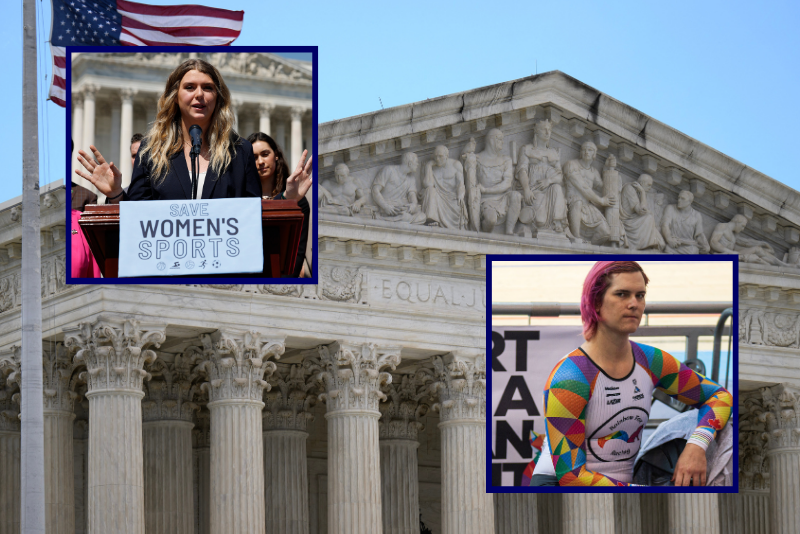


OAN Staff Brooke Mallory
3:09 PM – Thursday, July 3, 2025
The Supreme Court of the United States (SCOTUS) announced on Thursday that it will hear pivotal cases addressing whether biological males who identify as female student-athletes may be lawfully excluded from participating on girls’ and women’s sports teams at public schools.
The High Court will consider appeals from Idaho and West Virginia, where lower courts, controlled by liberal judges, ruled in favor of transgender students who challenged state laws that barred them from competing.
“I am optimistic that after hearing the case, the Supreme Court will restore sanity to athletics and allow West Virginia to enforce its commonsense law that prevents boys from competing in girl’s sports,” Gov. Patrick Morrisey (R-W.Va.) declared in an X post.
In recent years, 27 states have enacted legislation restricting participation in female sports for gender dysphoric male-to-female students.
Idaho and West Virginia, in particular, have Republican-led laws that mandate public school sports teams be designated according to “biological sex,” explicitly prohibiting “students of the male sex” from competing on girls’ teams — for obvious reasons related to the physical, athletic advantage that males possess over females.
The West Virginia statute is being challenged by Becky Pepper-Jackson, a biological male athlete who filed suit in 2021 after being barred from joining his middle school’s girls’ cross country and track teams.
Last year, another high school track athlete in West Virginia also joined an ongoing lawsuit challenging the inclusion of trans-identified males in female sports. The student, Adaleia Cross, who is identified in the declaration as “A.C.,” says that fellow track team member Becky Pepper-Jackson made several abusive and sexually vulgar remarks about her, which caused her “deep distress.”
“During the end of that year, about two to three times per week, B.P.J. would look at me and say ‘suck my d***.’ There were usually other girls around who heard this. I heard B.P.J. say the same thing to my other teammates, too,” Cross said. “B.P.J. made other more explicit sexual statements that felt threatening to me. At times, B.P.J. told me quietly ‘I’m gonna stick my d*** into your p***y.’ And B.P.J. sometimes added ‘and in your a**,’ as well. These comments were disturbing and caused me deep distress,” — as reported by Reduxx.
Pepper-Jackson’s parents reportedly began transitioning him into becoming a transgender girl “since third grade,” and he has been undergoing puberty-blocking treatments since then.
A federal judge had initially issued a ruling in the student’s favor during the early stages of the case, but subsequently reversed that decision, ultimately ruling in support of the state.
However, the U.S. Court of Appeals for the Fourth Circuit later ruled, without any regard for biological girls, that Pepper-Jackson’s exclusion from girls’ athletic teams constituted a “violation of Title IX,” the federal statute prohibiting sex-based discrimination in educational programs and activities.
“[Pepper-Jackson] has been publicly living as a girl for more than five years. During that time, her elementary and middle schools created gender support plans to affirm her gender identity and ensure she is recognized as a girl at school,” the appeals court ruling read. “To align with her gender identity, [Pepper-Jackson] has changed her name, and the State of West Virginia (whose Act is challenged here) has issued a birth certificate that recognizes her changed name and lists her sex as female. [Pepper-Jackson] also takes puberty blocking medication to prevent her body from experiencing male adolescent development and estrogen hormone therapy, which is leading her to develop the outward physical characteristics — including fat distribution, pelvic shape, and bone size — of an adolescent female. Her family, teachers, and classmates have all known [Pepper-Jackson] as a girl for several years, and — beginning in elementary school — she has participated only on girls athletic teams.
“Given these facts, offering [Pepper-Jackson] a ‘choice’ between not participating in sports and participating only on boys teams is no real choice at all.”
Meanwhile, the second legal challenge, coming from the state of Idaho, was brought by Lindsay Hecox, a transgender student at Boise State University who sought to join the university’s women’s track and cross-country teams, despite not meeting the qualification standards. Hecox has continued to participate in intramural sports, including soccer and running, at the public institution.
“I’m very grateful for the support I’ve gotten. I ultimately feel like this is gonna get repealed and we’re just in the process of doing that. On the other side, I understand what they’re thinking, but, ultimately, I’m not at any advantage I think, there would be tons and tons of trans women in every single sport if we were really at some fundamental advantage, but, that is not true…” Hecox told MSNBC’s Hallie Jackson during an appearance on the far-left network.
In 2020, a federal judge blocked Idaho’s law, ruling that it likely violated the Equal Protection Clause of the U.S. Constitution and unlawfully discriminated on the basis of sex and transgender status. The Ninth Circuit Court of Appeals upheld that decision in 2023 and reaffirmed it in a revised opinion the following year.
While the Supreme Court has agreed to review both the Idaho and West Virginia cases, it declined to take up another similar challenge coming from Arizona.
The High Court is expected to hear oral arguments sometime after its new term begins on October 6th.
Stay informed! Receive breaking news blasts directly to your inbox for free. Subscribe here. https://www.oann.com/alerts
